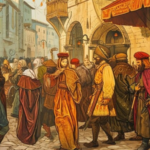Have you ever typed something strange or puzzling into Google just to see what it spits back? Maybe a quirky question, a riddle, or a phrase that seems to make no sense? That, my friend, is where Search Engine Riddles come into play. These aren’t your average puzzles — they’re search queries that challenge the very core of how search engines work, forcing them to think beyond keywords and tap into meaning, context, and intent.
If you’re curious about how your favorite search engines crack these mysterious queries, or if you want to use riddles to boost your SEO game, you’re in the right place. Let’s unravel this fascinating topic, step by step.

200+ “Search Engine Riddles” with Answers
Keyword Mysteries
- Riddle: I am the word you type to find what you seek online, but too many of me can confuse the search. What am I?
Answer: A keyword. - Riddle: I am a phrase used to narrow down your search results precisely. What am I?
Answer: A search query. - Riddle: Without me, your search would be vague and wild; I help bring the right results to your screen. What am I?
Answer: A keyword phrase. - Riddle: I’m the essential term you add to a search to find recipes, but if I’m too broad, you get too many options. What am I?
Answer: A keyword. - Riddle: When you want to search for “apple” the fruit, you add me to avoid tech results. What am I?
Answer: A keyword modifier. - Riddle: I’m a word that tells the search engine what to look for, whether a place, person, or thing. What am I?
Answer: A keyword. - Riddle: I’m the magic word you use with quotes to find exact matches online. What am I?
Answer: An exact keyword. - Riddle: Adding me before a keyword excludes results containing that word. What am I?
Answer: A minus sign (-). - Riddle: I am the word you type along with “how to” to find instructions online. What am I?
Answer: A keyword. - Riddle: I am the core word in a search that helps engines find the best matches. What am I?
Answer: A keyword.
Autocomplete Enigmas
- Riddle: I predict your words before you finish typing, saving time with suggestions. What am I?
Answer: Autocomplete. - Riddle: I finish your search query for you, often based on popular searches. What am I?
Answer: Autocomplete. - Riddle: I pop up with options after you type just a few letters. What am I?
Answer: Autocomplete suggestions. - Riddle: I can sometimes be funny or unexpected, completing your search in strange ways. What am I?
Answer: Autocomplete predictions. - Riddle: I use your typing history and popular searches to guess what you want. What am I?
Answer: Autocomplete. - Riddle: I’m the tool that tries to finish your thought before you do. What am I?
Answer: Autocomplete. - Riddle: I help you find the right spelling if you mistype words. What am I?
Answer: Autocomplete. - Riddle: I’m what you see below the search box showing common ways to finish your sentence. What am I?
Answer: Autocomplete dropdown. - Riddle: I sometimes show trending topics when you start typing a popular word. What am I?
Answer: Autocomplete. - Riddle: I help speed up your search by guessing your intent early. What am I?
Answer: Autocomplete.
Search Result Puzzles
- Riddle: I’m the page that shows links to websites matching your search terms. What am I?
Answer: Search results page. - Riddle: I rank websites by relevance so you find the best answers first. What am I?
Answer: Search engine ranking. - Riddle: I’m the little description under each link that tells you what’s on the page. What am I?
Answer: A snippet. - Riddle: I sometimes show images, videos, or news right in the results. What am I?
Answer: Rich results. - Riddle: I’m a box at the top answering your question directly without needing to click. What am I?
Answer: Featured snippet. - Riddle: I’m the link you click that matches the first search result. What am I?
Answer: The top-ranked URL. - Riddle: I appear when you type a question and I try to give you a quick answer. What am I?
Answer: Knowledge panel. - Riddle: I’m the total number you see indicating how many websites matched your search. What am I?
Answer: Number of search results. - Riddle: I’m the page number navigation at the bottom letting you see more results. What am I?
Answer: Pagination. - Riddle: I’m the section showing ads mixed with regular results on search pages. What am I?
Answer: Sponsored results.
Algorithm Anagrams
- Riddle: I’m a complex formula that decides what you see first in search results. What am I?
Answer: Search algorithm. - Riddle: I analyze your keywords and webpage content to rank pages. What am I?
Answer: Search algorithm. - Riddle: I get updated often to improve search quality and fight spam. What am I?
Answer: Algorithm update. - Riddle: I’m the secret code behind how search engines sort and rank websites. What am I?
Answer: Algorithm. - Riddle: Google’s main algorithm is named after me and a famous mathematician. What am I?
Answer: PageRank. - Riddle: I consider backlinks, content quality, and user signals to rank pages. What am I?
Answer: Search algorithm. - Riddle: I’m the process that bots use to read and index your website. What am I?
Answer: Crawling algorithm. - Riddle: I’m an algorithm feature that helps identify duplicate content. What am I?
Answer: Duplicate content filter. - Riddle: I am the part of the algorithm that understands user intent behind a query. What am I?
Answer: Semantic analysis. - Riddle: I’m a formula that updates how fresh content ranks in search results. What am I?
Answer: Freshness algorithm.
Query Quandaries
- Riddle: I am what you type to ask the search engine for information. What am I?
Answer: A search query. - Riddle: I am a question you enter to find answers online. What am I?
Answer: Search query. - Riddle: I sometimes use special characters like quotes or minus signs to refine results. What am I?
Answer: A complex query. - Riddle: I’m a single word you use to start your search. What am I?
Answer: A query keyword. - Riddle: I can be a phrase, question, or command typed into a search box. What am I?
Answer: A search query. - Riddle: I sometimes return zero results if too specific or uncommon. What am I?
Answer: A rare query. - Riddle: I’m the phrase you type when you don’t know exactly what you’re looking for. What am I?
Answer: A vague query. - Riddle: I’m a query with Boolean operators like AND, OR, and NOT to combine terms. What am I?
Answer: A Boolean query. - Riddle: I’m the question or phrase that triggers voice search assistants. What am I?
Answer: A voice query. - Riddle: I’m a query typed in multiple languages to get global results. What am I?
Answer: A multilingual query.
Hidden Hyperlinks
- Riddle: I am a clickable text or image that leads you to another webpage. What am I?
Answer: A hyperlink. - Riddle: I look like regular text but send you somewhere else when clicked. What am I?
Answer: A hidden link. - Riddle: I’m often underlined and colored blue to show I can be clicked. What am I?
Answer: A hyperlink. - Riddle: I’m a link that’s invisible but still takes you to another page. What am I?
Answer: A hidden hyperlink. - Riddle: I help search engines find related pages through linking. What am I?
Answer: A backlink. - Riddle: I’m a link embedded in an image rather than text. What am I?
Answer: An image hyperlink. - Riddle: I’m a link disguised within a website’s code that users don’t see. What am I?
Answer: A hidden hyperlink. - Riddle: I’m a URL embedded in text that guides you to more info. What am I?
Answer: A hyperlink. - Riddle: I am used for SEO to connect pages but can be penalized if hidden improperly. What am I?
Answer: Hidden links. - Riddle: I’m a link you click that jumps to a specific section on the same page. What am I?
Answer: An anchor link.
Meta Tag Riddles
- Riddle: I’m a snippet of text in a webpage’s code that describes its content to search engines. What am I?
Answer: A meta description. - Riddle: I tell search engines the title of the webpage, often seen at the top of the browser. What am I?
Answer: A meta title tag. - Riddle: I’m a tag that helps control how search engines index or follow a page. What am I?
Answer: A meta robots tag. - Riddle: I provide keywords related to a webpage to improve search ranking, though less used now. What am I?
Answer: A meta keywords tag. - Riddle: I’m hidden from users but visible to search engines in the webpage’s HTML. What am I?
Answer: Meta tags. - Riddle: I’m the tag that can instruct search engines to not index a page. What am I?
Answer: Noindex meta tag. - Riddle: I help define the language of the webpage for search engines and browsers. What am I?
Answer: Meta language tag. - Riddle: I’m a tag that controls the viewport for mobile responsiveness. What am I?
Answer: Meta viewport tag. - Riddle: I’m a tag that can specify the author of the webpage. What am I?
Answer: Meta author tag. - Riddle: I’m the tag that controls the character encoding for the webpage. What am I?
Answer: Meta charset tag.
URL Codes
- Riddle: I’m the unique address you type to visit a website. What am I?
Answer: A URL. - Riddle: I’m a part of the URL that follows a question mark and passes data. What am I?
Answer: A query string. - Riddle: I use codes like %20 to replace spaces and special characters. What am I?
Answer: URL encoding. - Riddle: I start with “http” or “https” and guide you across the web. What am I?
Answer: A URL scheme. - Riddle: I redirect you to another page without changing the browser address. What am I?
Answer: A masked redirect. - Riddle: I’m a shortened form of a URL, often used in social media. What am I?
Answer: A URL shortener. - Riddle: I am the domain part that tells you what site you’re on. What am I?
Answer: A hostname. - Riddle: I represent the secure version of a web address. What am I?
Answer: HTTPS. - Riddle: I’m the part of the URL after the domain that shows the page path. What am I?
Answer: A URL path. - Riddle: I help search engines differentiate between pages with similar content using rel=“canonical”. What am I?
Answer: Canonical URL.
Captcha Challenges
- Riddle: I test if you’re a human by asking you to pick fire hydrants. What am I?
Answer: A CAPTCHA. - Riddle: I might make you read blurry text to prove you’re not a robot. What am I?
Answer: CAPTCHA test. - Riddle: I’m a newer version that checks if you’re human without asking you anything. What am I?
Answer: reCAPTCHA v3. - Riddle: I use image recognition puzzles to block bots. What am I?
Answer: Image CAPTCHA. - Riddle: I may ask you to click boxes with buses or crosswalks. What am I?
Answer: Visual CAPTCHA. - Riddle: I’m often used during login or form submission to prevent spam. What am I?
Answer: CAPTCHA. - Riddle: I make sure only real users can submit information to the site. What am I?
Answer: CAPTCHA validation. - Riddle: I’m a checkbox labeled “I’m not a robot.” What am I?
Answer: reCAPTCHA checkbox. - Riddle: I confuse bots but annoy users with tricky challenges. What am I?
Answer: CAPTCHA. - Riddle: I’m a defense system that filters traffic using human logic tests. What am I?
Answer: CAPTCHA system.
Browser Breadcrumbs
- Riddle: I show you the path of pages you took to reach your current one. What am I?
Answer: Breadcrumb navigation. - Riddle: I’m the clickable trail at the top of a webpage, showing where you’ve been. What am I?
Answer: Breadcrumbs. - Riddle: I help users understand site structure and return to previous sections. What am I?
Answer: Breadcrumb trail. - Riddle: I’m both a navigation aid and an SEO feature. What am I?
Answer: Breadcrumbs. - Riddle: I often show categories and subcategories of a site. What am I?
Answer: Breadcrumb links. - Riddle: I look like “Home > Blog > SEO Tips” and help users orient themselves. What am I?
Answer: A breadcrumb path. - Riddle: I help both users and search engines understand page hierarchy. What am I?
Answer: Breadcrumb structure. - Riddle: I sometimes appear in search results to show site structure. What am I?
Answer: Breadcrumb markup. - Riddle: I guide you back up the site’s structure without using the back button. What am I?
Answer: Breadcrumbs. - Riddle: I’m generated using schema.org to enhance search listings. What am I?
Answer: Structured breadcrumbs.
Search History Secrets
- Riddle: I store all your previous queries and visited links. What am I?
Answer: Search history. - Riddle: I help autocomplete by using what you’ve looked for before. What am I?
Answer: Search history. - Riddle: You can delete me to keep your searches private. What am I?
Answer: Browser history. - Riddle: I remember your past searches and can show them as suggestions. What am I?
Answer: Search suggestions. - Riddle: I let you revisit past searches from your Google account. What am I?
Answer: My Activity. - Riddle: I personalize your results using past browsing behavior. What am I?
Answer: Personalized search. - Riddle: I log your past online activity unless you’re in incognito mode. What am I?
Answer: Search history. - Riddle: I’m the incognito version of browsing that leaves no search trail. What am I?
Answer: Private browsing. - Riddle: I may help ads follow you based on your past searches. What am I?
Answer: Search tracking. - Riddle: I’m the digital footprint of your web queries. What am I?
Answer: Search history.
Snippet Sleuths
- Riddle: I’m a short description under a search result link. What am I?
Answer: A snippet. - Riddle: I give you a quick summary of a webpage before you click. What am I?
Answer: Meta description. - Riddle: I sometimes appear at the top of results to directly answer questions. What am I?
Answer: Featured snippet. - Riddle: I’m designed to provide instant answers like definitions or conversions. What am I?
Answer: Quick answer box. - Riddle: I can show a list, paragraph, or table format right in the results. What am I?
Answer: Featured snippet. - Riddle: I often pull text from a webpage to highlight an answer. What am I?
Answer: Snippet content. - Riddle: I’m meant to increase click-through rate by summarizing the page. What am I?
Answer: Meta snippet. - Riddle: I can appear as a knowledge panel or an instant answer. What am I?
Answer: Search snippet. - Riddle: I may include ratings, FAQs, or product info as extras. What am I?
Answer: Rich snippet. - Riddle: I’m a mini preview of the page content crafted for search engines. What am I?
Answer: Snippet.
Ranking Riddles
- Riddle: I determine which webpage appears first in search results. What am I?
Answer: Page ranking. - Riddle: I measure a site’s authority using backlinks and quality. What am I?
Answer: Domain authority. - Riddle: I fluctuate based on algorithm changes and SEO updates. What am I?
Answer: Search ranking. - Riddle: I’m the goal of every SEO expert—to be at the top. What am I?
Answer: Rank one. - Riddle: I drop if your content becomes outdated or irrelevant. What am I?
Answer: Page rank. - Riddle: I depend on speed, mobile-friendliness, and relevance. What am I?
Answer: SEO ranking. - Riddle: I may increase with quality content and consistent updates. What am I?
Answer: Search engine position. - Riddle: I am boosted by good backlinks and high engagement. What am I?
Answer: Page rank. - Riddle: I may be harmed by keyword stuffing or duplicate content. What am I?
Answer: Ranking score. - Riddle: I’m the result position most users click—what every site wants. What am I?
Answer: Top search rank.
Boolean Logic Brainteasers
- Riddle: I combine keywords with AND, OR, and NOT to refine searches. What am I?
Answer: Boolean logic. - Riddle: I include results that match both “cat” AND “dog”. What am I?
Answer: AND operator. - Riddle: I exclude results that contain “bird” with a single symbol. What am I?
Answer: NOT operator (-). - Riddle: I search for either “car” OR “bike”. What am I?
Answer: OR operator. - Riddle: I’m a way to narrow or broaden search results using logic. What am I?
Answer: Boolean search. - Riddle: I group conditions using parentheses for complex queries. What am I?
Answer: Boolean grouping. - Riddle: I am the opposite of inclusion, filtering out terms. What am I?
Answer: NOT logic. - Riddle: I link search terms flexibly using the OR command. What am I?
Answer: Logical disjunction. - Riddle: I require both terms to be present in results using AND. What am I?
Answer: Logical conjunction. - Riddle: I simplify advanced searches using logical operators. What am I?
Answer: Boolean logic.
Cache Conundrums
- Riddle: I’m a saved version of a webpage stored by search engines. What am I?
Answer: Cached page. - Riddle: You can access me if a site is down but was once indexed. What am I?
Answer: Cached copy. - Riddle: I show you what a site looked like the last time I visited. What am I?
Answer: Google cache. - Riddle: I help speed up browsing by storing copies of visited pages. What am I?
Answer: Browser cache. - Riddle: I can sometimes show outdated content until refreshed. What am I?
Answer: Cached content. - Riddle: I’m cleared when you want the latest version of a page. What am I?
Answer: Cache memory. - Riddle: I store HTML and images locally to improve performance. What am I?
Answer: Cache storage. - Riddle: I might cause confusion when updates don’t appear. What am I?
Answer: Stale cache. - Riddle: I’m a part of your browser that can be manually cleared. What am I?
Answer: Cached data. - Riddle: I’m the clue to seeing a webpage’s past without the Wayback Machine. What am I?
Answer: Cached link in search results.
Pop-up Paradoxes
- Riddle: I suddenly appear on your screen, often asking for action. What am I?
Answer: A pop-up. - Riddle: I block your view and may ask for your email. What am I?
Answer: Pop-up window. - Riddle: I can be helpful or annoying, depending on intent. What am I?
Answer: Pop-up ad. - Riddle: I appear automatically and often get blocked by browsers. What am I?
Answer: Automatic pop-up. - Riddle: I ask if you want to allow notifications from a website. What am I?
Answer: Pop-up prompt. - Riddle: I’m often closed with a tiny X in the corner. What am I?
Answer: Pop-up window. - Riddle: I’m the reason many users install ad blockers. What am I?
Answer: Pop-up advertisement. - Riddle: I may appear based on exit intent to keep you on the site. What am I?
Answer: Exit pop-up. - Riddle: I’m sometimes used to show login forms or surveys. What am I?
Answer: Modal pop-up. - Riddle: I’m frequently penalized by search engines if I block mobile content. What am I?
Answer: Intrusive pop-up.
Search Suggestion Surprises
- Riddle: I finish your sentence before you do while searching. What am I?
Answer: Autocomplete. - Riddle: I’m a list of predicted queries below the search bar. What am I?
Answer: Search suggestions. - Riddle: I surprise you with popular questions you never typed. What am I?
Answer: People Also Ask box. - Riddle: I’m generated based on trending topics and your history. What am I?
Answer: Predictive search. - Riddle: I often reflect what others are asking, not just you. What am I?
Answer: Autocomplete suggestions. - Riddle: I sometimes show weird or funny completions. What am I?
Answer: Search surprise. - Riddle: I learn from everyone’s input to shape what you see. What am I?
Answer: Collective query data. - Riddle: I appear even before you press “Enter.” What am I?
Answer: Instant search suggestion. - Riddle: I might reveal embarrassing searches you didn’t intend. What am I?
Answer: Suggestion history. - Riddle: I can be cleared or paused from your browser settings. What am I?
Answer: Search suggestion memory.
Indexing Intrigues
- Riddle: I’m the digital filing system for search engines. What am I?
Answer: Index. - Riddle: I’m the process of adding web pages to a search engine. What am I?
Answer: Indexing. - Riddle: I’m skipped when a “noindex” tag is used. What am I?
Answer: Page exclusion. - Riddle: I help users find pages even if they’re deep within a site. What am I?
Answer: Search index. - Riddle: I need a sitemap to know what to store. What am I?
Answer: Search engine index. - Riddle: I can be delayed if your site isn’t mobile-friendly. What am I?
Answer: Indexing process. - Riddle: I update regularly but not instantly. What am I?
Answer: Index refresh. - Riddle: I rely on bots to gather what I need. What am I?
Answer: Indexing system. - Riddle: I’m the reason your new blog post shows up in search results. What am I?
Answer: Indexed page. - Riddle: I ensure your site is searchable by organizing its content. What am I?
Answer: Indexing engine.
Semantic Search Scenarios
- Riddle: I understand the meaning behind your words, not just the keywords. What am I?
Answer: Semantic search. - Riddle: I match intent with results, not exact phrases. What am I?
Answer: Intent-based search. - Riddle: I consider synonyms and context in your query. What am I?
Answer: Semantic analysis. - Riddle: I use NLP to understand human language better. What am I?
Answer: Semantic engine. - Riddle: I help search engines understand the relationship between words. What am I?
Answer: Semantic web. - Riddle: I turn “best pizza” into “top-rated pizza places nearby.” What am I?
Answer: Semantic query. - Riddle: I improve results by learning from human behavior. What am I?
Answer: AI-powered semantic search. - Riddle: I can answer questions even if they’re worded differently. What am I?
Answer: Contextual search. - Riddle: I use schema markup to add meaning to web content. What am I?
Answer: Structured data. - Riddle: I focus on user needs, not just keywords. What am I?
Answer: Semantic search strategy.
Spider Crawl Challenges
- Riddle: I explore the web and bring data back to the engine. What am I?
Answer: A web crawler. - Riddle: I’m also called a spider and help pages get discovered. What am I?
Answer: Search bot. - Riddle: I follow links from one page to the next. What am I?
Answer: Crawlbot. - Riddle: I’m restricted when robots.txt blocks me. What am I?
Answer: Web crawler access. - Riddle: I gather content before it gets indexed. What am I?
Answer: Crawling process. - Riddle: I might avoid pages with “nofollow” tags. What am I?
Answer: Crawler bot. - Riddle: I check for broken links and inaccessible pages. What am I?
Answer: SEO crawler. - Riddle: I’m the starting point for search engines to understand a site. What am I?
Answer: Crawl cycle. - Riddle: I slow down when your site has too many redirects. What am I?
Answer: Crawl efficiency. - Riddle: I leave digital footprints when I scan a website. What am I?
Answer: Crawl log.
Introduction to Search Engine Riddles
What Are Search Engine Riddles?
Imagine typing “What has keys but can’t open locks?” into a search engine. That’s a classic riddle about a piano, but you’re asking a machine to figure it out! A Search Engine Riddle is any search query that isn’t straightforward. It’s puzzling, ambiguous, or crafted with wordplay that challenges the search engine’s algorithms.
Unlike a simple query like “best pizza near me,” riddles require the search engine to interpret beyond the surface. They test how well AI understands human language, idioms, slang, and even humor. They’re like a secret game between you and the algorithm.
Why Do They Matter in the Digital World?
You might wonder, why bother with riddles at all? Well, they matter for a few big reasons:
- AI Improvement: Riddles push search engines to get smarter by handling complex language.
- User Engagement: They make searching fun and sometimes viral — think of Google’s famous “do a barrel roll” Easter egg.
- SEO Potential: Marketers use riddles to craft unique content that stands out in crowded search results.
In short, search engine riddles aren’t just fun; they’re a window into the future of how we’ll interact with machines.
The Anatomy of a Search Engine Riddle
Breaking Down the Puzzle
So, what exactly makes a search query a “riddle”? It boils down to a few key ingredients:
- Ambiguity: The query can have multiple meanings.
- Wordplay: Using metaphors, puns, or idioms.
- Complexity: Queries that ask multiple questions or combine different ideas.
For example, the query “I speak without a mouth and hear without ears. What am I?” is a riddle for “an echo.” Here, the search engine needs to connect abstract clues rather than just find matching keywords.
How Search Engines Interpret Queries
Search engines don’t just match words — they analyze intent. When you type a query, the engine:
- Tokenizes the sentence (breaks it into parts).
- Analyzes grammar and syntax to understand relationships.
- Matches query words with indexed content.
- Uses context and user data (location, previous searches) to refine results.
This process is why sometimes Google seems to “read your mind” and deliver exactly what you want, even if your query is oddly worded.
The Role of Keywords and Semantics
Keywords still matter, but semantics—the meaning behind the words—has become king. Think of “apple” — are you searching for the fruit, the company, or maybe even a song title? The search engine uses clues around the query and your behavior to guess which one fits best.
Types of Search Engine Riddles
- Literal vs. Figurative Queries
Literal queries are simple, like “how to bake bread.”
Figurative queries use metaphor or abstract language — like “How do you catch the wind?” which might mean “how to achieve the impossible.”
Figurative queries are trickier because they rely on shared cultural knowledge or creative thinking.
- Ambiguous Queries
Ambiguity is a hallmark of riddles. Take “jaguar” — are we talking about the animal, the car brand, or the sports team? Search engines must guess, and sometimes they get it wrong!
- Complex Multi-Part Questions
Some riddles combine multiple ideas, such as “What’s the fastest animal that can both fly and swim?” Here, the engine has to filter facts about speed, flying ability, and swimming all at once.
Why Do People Use Search Engine Riddles?
- Fun and Challenge
People love pushing technology to its limits. Typing riddles into search engines is like playing chess with a computer — testing if it can keep up with human creativity.
- Testing Search Engine Intelligence
Tech enthusiasts use riddles as informal tests of how “smart” search engines are. It’s fascinating to see how AI evolves in understanding nuance.
- Enhancing SEO Strategies
For marketers, riddles are gold mines. Creating content that answers unusual or tricky questions can help capture niche search traffic — people looking for exactly that clever answer.
Search Engine Riddles in SEO
- Impact on Keyword Strategy
Traditional keyword strategies focused on direct matches. But riddles encourage content creators to think in terms of search intent and semantic variations, which broadens their reach.
- Creating Content That Solves Riddles
If you can write blog posts or videos that solve popular riddles or complicated questions, you’re likely to attract visitors who need that precise info — and Google loves satisfying user intent!
- Using Riddles to Boost Engagement
Riddles naturally invite curiosity and sharing. When people find answers to tricky questions on your site, they’re more likely to stay longer and explore, improving your site’s SEO signals.
How Search Engines Solve Riddles
- Algorithms Behind the Scenes
Behind every riddle-solving act is a complex algorithm. Google’s algorithm evaluates billions of pages, looking for the best fit for your query.
- Natural Language Processing (NLP)
NLP is the magic that allows machines to understand language nuances, idioms, and even emotions. It’s why Google can answer “What’s the weather like?” just as easily as “Will I need an umbrella tomorrow?”
- Machine Learning and AI’s Role
Machine learning models train on vast amounts of data to recognize patterns and improve over time. They get better at recognizing riddles by learning from millions of past searches and their results.
Challenges for Search Engines
- Understanding Context
Context is king, and sometimes it’s hard for machines. For example, the phrase “bark” might mean the sound a dog makes or the outer layer of a tree — without context, it’s a guessing game.
- Handling Ambiguity
Ambiguity in language remains a big hurdle. Machines can misinterpret jokes or sarcastic riddles, delivering answers that seem silly or irrelevant.
- The Limitations of AI Today
Though AI has made leaps, it still struggles with complex humor, cultural references, and abstract thinking — the very heart of many riddles.
Examples of Popular Search Engine Riddles
- Classic Riddles Transformed into Search Queries
Ever Googled “What has hands but can’t clap?” The answer is “a clock,” but it’s fun to see the variety of results you get, from children’s sites to forums discussing riddle answers.
- Viral Search Engine Puzzles
Google loves surprises! Try typing “do a barrel roll” or “tilt” and watch the screen spin or tilt. These interactive “riddles” delight users and showcase the playful side of search.
Case Study: Google’s “Did You Mean?” Feature
- How It Fixes User Queries
If you mistype “restuarant near me,” Google instantly suggests “restaurant near me.” This feature isn’t just spelling correction; it’s the search engine acting like a riddle solver, guessing what you meant.
- Examples of Real-Time Query Corrections
Such suggestions improve user experience and ensure people get meaningful results even if their query is unclear or incorrect.
How to Craft Search Engine Riddles for Fun or SEO
Tips for Writing Effective Riddles
- Use double meanings and wordplay.
- Mix literal and figurative language.
- Incorporate popular idioms or cultural references.
- Make them intriguing but solvable with some thought.
Balancing Clarity and Mystery
Too vague, and no one will find you; too obvious, and it’s boring. The trick is to strike a balance that invites curiosity without causing confusion.
The Future of Search Engine Riddles
- Advances in AI and User Interaction
As AI gets more sophisticated, it will better handle abstract, nuanced queries, solving riddles more accurately and conversationally.
- Voice Search and Conversational Queries
Voice assistants like Siri and Alexa are changing the game. People ask questions aloud, often in riddle-like forms, making natural language understanding essential.
Practical Tips for Users
How to Solve Search Engine Riddles Yourself
- Break queries into smaller parts.
- Use synonyms or related terms.
- Check search suggestions and related searches.
- Try phrasing your question differently.
Using Riddles to Find Better Results
Sometimes, approaching a problem like a riddle encourages creative searches that uncover unique or unexpected answers.
Conclusion
We hope you enjoyed diving into these 200+ search engine riddles as much as we enjoyed putting them together. Whether you’re an SEO enthusiast, a puzzle lover, or just someone looking for a clever way to challenge your mind, these riddles are a great way to blend fun with a bit of tech-savvy thinking. If you’re hungry for more brain-bending fun, don’t miss our 200+ “If The World Could Sing To Me Riddles” with Answers — a collection that’s just as imaginative and engaging. Keep exploring, keep guessing, and most importantly, keep having fun!
FAQs
Q. What exactly is a search engine riddle?
It’s a puzzling or ambiguous query typed into a search engine that challenges its ability to interpret and return meaningful results.
Q. Can search engine riddles improve SEO?
Yes! They help uncover unique keyword opportunities and create engaging content that matches complex user intent.
Q. How do search engines handle ambiguous queries?
Through algorithms, NLP, and learning from user behavior, they try to guess the most relevant meaning.
Q. Are search engine riddles used by marketers?
Absolutely. They help in crafting content that attracts curious users and boosts engagement.
Q. What’s the future outlook for search engine riddles?
With smarter AI and voice search, these riddles will become more conversational and better understood by machines.










